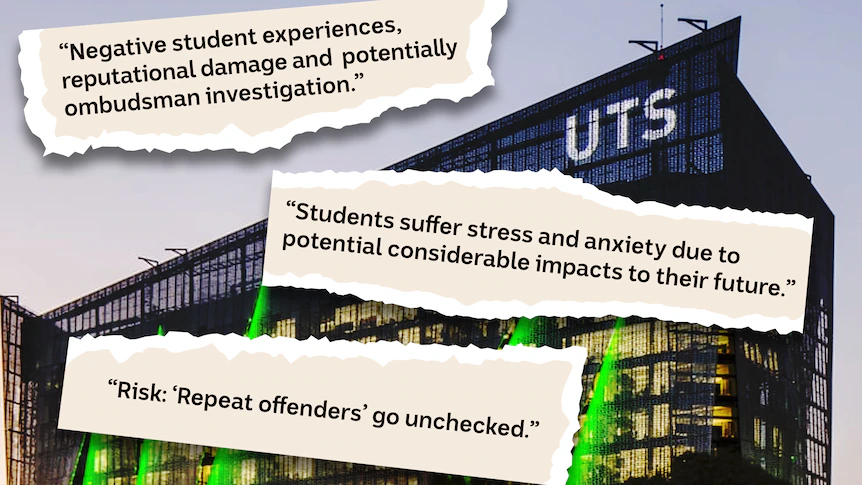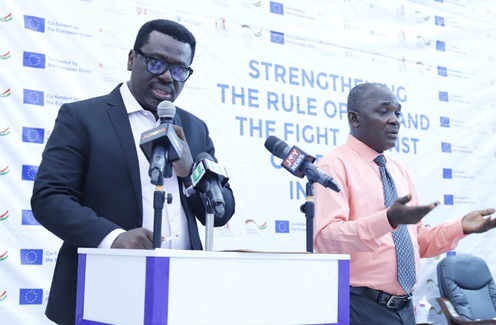By Conor Duffy,Scout Wallen
Copyright abc

The National Student Ombudsman (NSO) is investigating allegations UTS has failed to improve its response to sexual harm and gender-based violence despite four reviews since 2022.
Universities are working to improve their responses to sexual assault after a 2021 survey found 16 per cent of Australian students had experienced sexual harassment.
Just 3 per cent of those students made a formal complaint.
That low number contributed to the creation of the NSO and a tough new code that requires universities improve their response to complaints by next year.
The ABC spoke with three UTS students who complained about drawn out timelines, poor communication, and a lack of a coordinated response to their complaints.
The ombudsman’s investigation was triggered by a complaint from the President of the UTS Students’ Association, Mia Campbell, who said her efforts to push for reform internally were fruitless.
“I tried absolutely everything else and I just have completely lost faith in university management to take this issue seriously without significant external pressure,” Ms Campbell said.
“I hope this means UTS has to take notice of the fact students have been telling them for years, this process is failing, it’s re-traumatised people who’ve reported, and it’s completely unfair.”
UTS Deputy Vice-Chancellor Professor Kylie Readman told ABC News the university was committed to reform.
“I’m really sorry that that’s been their experience, because nobody who’s experienced trauma should have to be re-traumatised by a process when they’ve bravely come forward to ask for help,” Ms Readman said.
“There are lots of things we can do to improve that process. My door is always open if they want to come to me directly, I’m very happy to listen and to act.”
Since 2022, the university has commissioned four separate reviews into its response to sexual harm on campus.
The most recent review, delivered in May this year, warned that the inconsistent application of policy and procedures had put the university at risk of reputational damage and a potential ombudsman investigation.
The ABC can now reveal the NSO is investigating why there have been so many reviews and why so many recommendations are yet to be implemented.
Issues with the reporting process
Hailey* reported allegations of sexual harassment by another student to UTS this year.
She said the communication with the university was inconsistent and drawn out.
“They had so many different people reach out to me throughout this entire process and I don’t think I ever had one clear direct form of communication,” she said.
“There’s never been a point where there’s just been genuine support.”
She said the process affected her grades and her willingness to go to campus because nothing had been put in place to make her feel safe.
“I honestly at times regret even reporting.”
In documents seen by the ABC, the university ruled Hailey’s allegations could not be substantiated “on the available evidence”.
“I remember sitting in that meeting and just shaking and being like, ‘this has taken four to five months for this outcome to be reached and in that time, the social detriment that it’s had in my life is so awful’.”
‘I can’t move on’
Another student — who we have called Holly — reported an incident to UTS in July last year, and said she still doesn’t have an outcome, despite the investigation concluding.
“They have the report, but they are refusing to release it to me,” she said.
Holly said throughout the process, she only received updates when she emailed the university.
“I literally have a diary reminder every two weeks to chase it up in the hope that one time when I do, there will be an outcome.
Holly said she wants to see the student misconduct process split into academic and behavioural complaints.
“In academic conduct you don’t really care because it’s not really about you … maybe they plagiarised your work and that’s upsetting but like when it’s about you and you’re being treated just as a reporter rather than a victim, it’s quite dehumanising.”
Ms Readman said the university had hired support workers this year to ensure complainants had a single point of contact and assistance with extra support for classes.
“We’ve employed safety case workers for all complainants to work with so that they don’t have to retell their story at multiple stages,” she said.
“[And] so they have someone that can work with them as an advocate and can also smooth the road in relation to academic and other requirements.”
Four reviews in three years
Issues like those raised by Hailey and Holly were examined in four reviews the university has undertaken since 2022.
The findings of those reviews include the absence of a clear definition of sexual harassment, drawn out timelines, and victims not having the right of rebuttal once the perpetrator had responded to their claims.
The 2023 review explicitly recommended providing a clear definition of sexual harm and improving the experience of those who reported in relation to timeliness and communication.
In 2024, the same examiner authored another review into the university’s student rules, flagging ongoing issues with the response to sexual harm, including “unease about the siloed approach that may be emerging”.
This year, an internal review highlighted students’ mental wellbeing was at risk due to the lengthy processing time of reports.
It found a lack of data collection meant avoidable sexual harm and gender-based violence may continue and repeat offenders may go unchecked.
Ms Campbell said the four reviews showed action was not being taken fast enough.
Ms Readman said the university appreciated Ms Campbell’s work in lobbying for change.
“Mia has been an excellent advocate and has played a fantastic role as president to bring the attention of the university to student concerns.
“I think this is an area where you can’t move quickly enough and I understand the frustration that she must be experiencing.”
She said the reviews demonstrated the university’s commitment to change and all recommendations were in the process of being implemented.
In a statement, the NSO said it could not comment on “current” investigations.
However, it said since February 2,500 students from different universities had contacted the ombudsman for general advice about a variety of complaints noting it had powers to compel institutions to provide documents.
“Use of our investigation function enables the NSO to formally report to the provider with findings and recommendations for action, and to make reports public or otherwise make a public statement relating to what we found in the investigation,” a spokesperson said.
Ms Readman said the university was “confident” it would be able to provide documents to the NSO in the requested time-frame.
National approach
Public universities across Australia are gearing up to implement the National Higher Education Code to Prevent and Respond to Gender-based Violence by January 1 next year.
It was passed by parliament in August and sets rules for higher education providers to embed a whole-of-organisation approach.
Specific measures include a 45-day turn around for reports and training staff how to take a trauma-informed and person-centred approach.
It also mandated a definition of gender-based violence as; “any form of physical or non-physical violence, harassment, abuse or threats, based on gender, that results in, or is likely to result in, harm, coercion, control, fear or deprivation of liberty or autonomy.”
“I think at the rate they’re going, they’re definitely not going to be compliant with the code by the 1st of January,” Ms Campbell said.
Ms Readman said it would be a lot of work but was “confident” the university would be compliant by January 1.
*Name has been changed to protect privacy.



